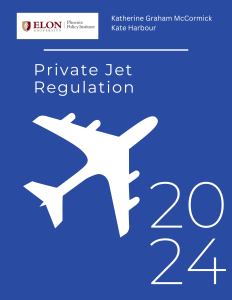- Home
- Academics
- Arts & Sciences
- Political Sciences
- Phoenix Policy Institute
- Environmental Policy
Environmental Policy
Environmental Policy
Climate Change
Private Jet Regulation
By: Katherine Graham McCormick and Kate Harbour
Published: Spring 2024
Abstract: Globally, aviation is responsible for 3.5% of human-driven climate change and 2.4% of global carbon outputs; 4% of carbon emissions from aviation are due to private jet use (Collins, Ocampo, & Thomhave, 2023). Traveling by airplane is the least environmentally friendly method of transportation, with an average of 1/4 tonne of CO2 equivalent per passenger per hour of flying (Carbon Independent) on a commercial plane. For private jet passengers, this number is at least ten times higher. Private jet usage has rapidly increased in the last two decades, with the amount of private jets globally growing from 9,895 in 2000 to 23,122 in mid-2022, an almost 133% increase (Air Industry Review). Despite their rapid growth within the aviation industry, negative impacts on the environment, and heavy reliance on taxpayer funded services, private jets go relatively unchecked and untaxed. The following policy memo will analyze existing regulations on private jets and provide potential solutions to address the shortcomings in current private jet regulation.
